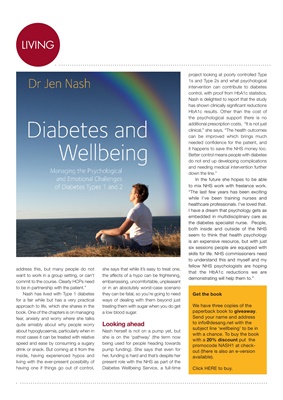
LIVINGLIVINGLIVING
approach to life, which she shares in the
book. One of the chapters is on managing
fear, anxiety and worry where she talks
quite amiably about why people worry
about hypoglycaemia, particularly when in
most cases it can be treated with relative
speed and ease by consuming a sugary
drink or snack. But coming at it from the
inside, having experienced hypos and
living with the ever-present possibility of
having one if things go out of control,
she says that while it's easy to treat one,
the affects of a hypo can be frightening,
embarrassing, uncomfortable, unpleasant
or in an absolutely worst-case scenario
they can be fatal, so you're going to need
ways of dealing with them beyond just
treating on with sugar when you do go
hypo. [see extracts from book on p. x]
Looking ahead
Nash herself is not on a pump yet, but
she is on the 'pathway' (the term now
being used for people heading towards
pump funding). She says that even for
her, funding is hard and that's despite her
present role with the NHS as part of the
Diabetes Wellbeing Service, a full-time
project looking at poorly controlled Type
1s and Type 2s and what psychological
intervention can contribute to diabetes
control, with proof from HbA1c statistics.
Nash is delighted to report that the
study has given clinically significant
HbA1c results. Other than the cost of
the psychological support there is no
additional prescription costs. "It is not just
clinical," she says, "The health outcomes
can be improved which brings much
needed confidence for the patient, and
it happens to save the NHS money too.
Better control means people with diabetes
do not end up developing complications
and needing medical intervention further
town the line."
In the future she hopes to be able
to mix NHS work with freelance work.
"The last few years has been exciting
while I've been training nurses and
healthcare professionals. I've loved that.
I have a dream that psychology gets as
embedded in multidisciplinary care as
the diabetes specialist nurse. People,
both inside and outside of the NHS
seem to think that health psychology
is an expensive resource, but with just
six sessions people are equipped with
skills for life. NHS commissioners need
to understand this."
Get the book
We have three copies
of the paperback book
to giveaway. Send your
name and address to
info@desang.netttp://desang.net" target="_blank" title="Visit desang.net">desang.net with the
subject line 'wellbeing' to
be in with a chance. To
buy the book with a 20%
discount put the promocode NASH1 at checkout
(there is also an e-version
available).
Click HERE to buy.